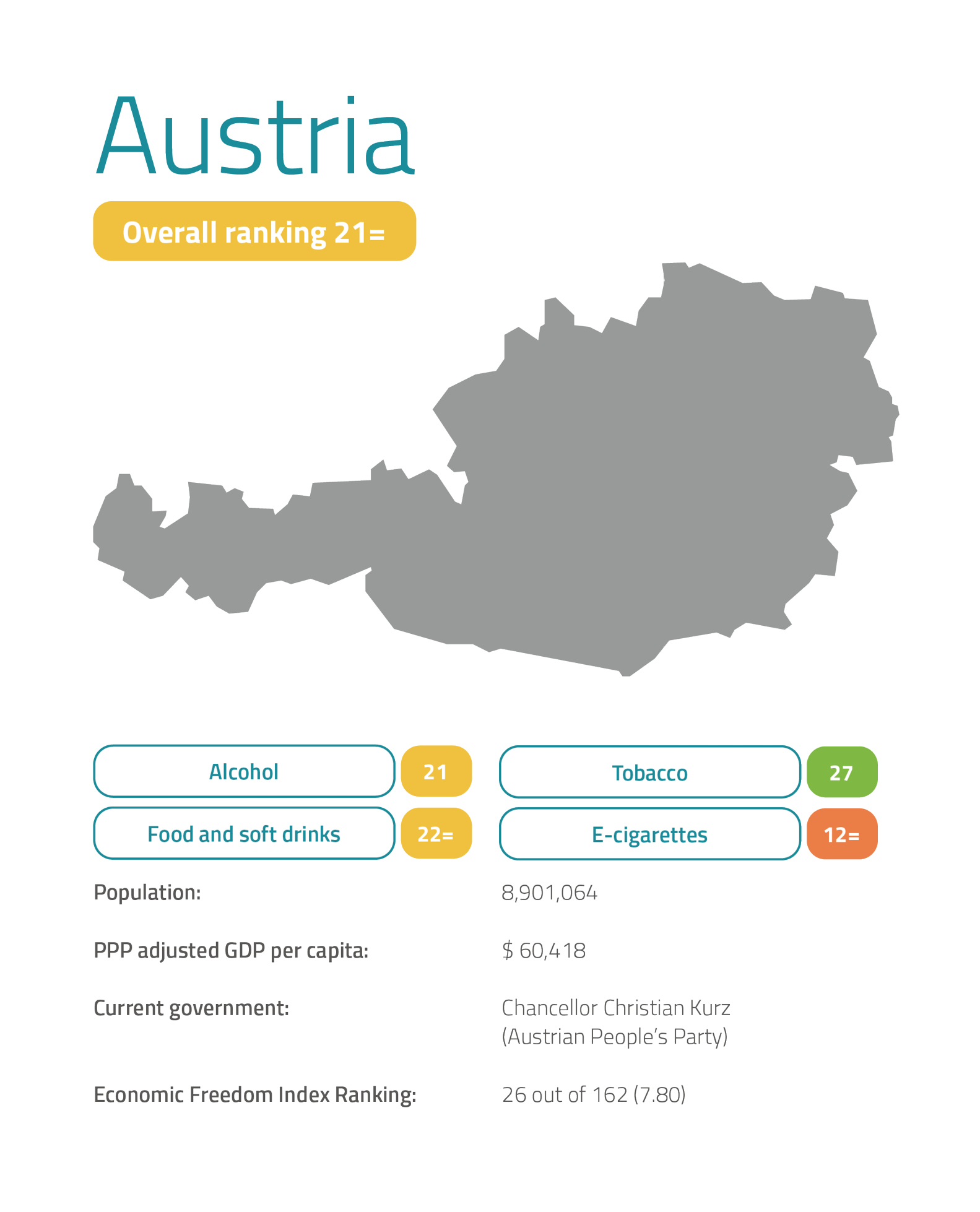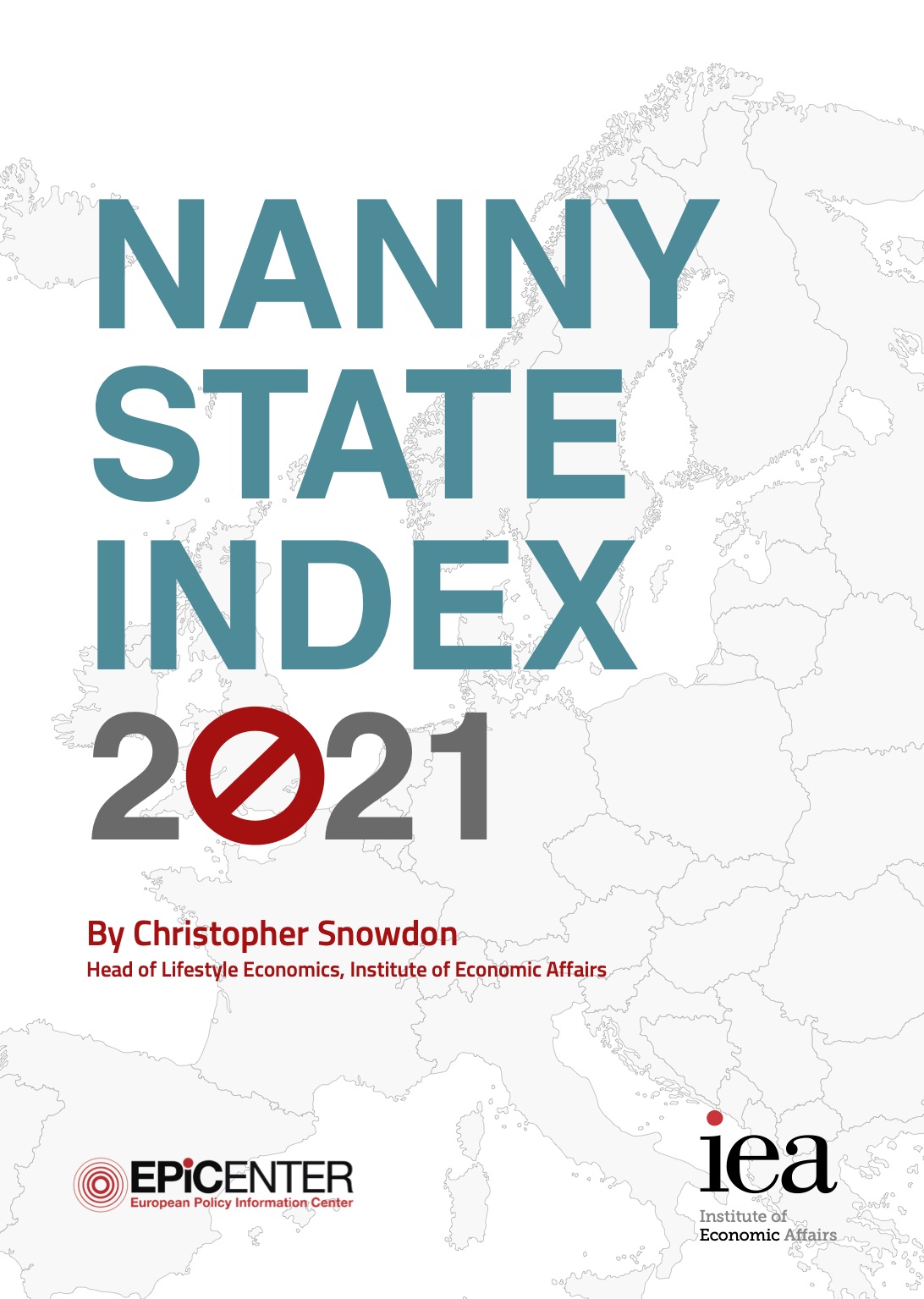
Austria has performed well on the Nanny State Index in the past, but is now climbing the table thanks to its treatment of smokers and vapers. A full indoor smoking ban was introduced on 1 November 2019, bringing to an end a run-longing saga in one of Europe’s last smoker-friendly countries. The ban had been due to begin in 2018 but was abandoned when a new government was elected in December 2017. Instead, the government introduced a ban on smoking (and vaping) in cars with passengers under the age of 18.
However, when the coalition government fell apart, the threat of a ban returned. Now in force for over a year, it includes e-cigarette use which is banned everywhere smoking in banned. There are no exemptions.
Austria’s taxes on beer and spirits are relatively low and it is one of the 15 EU member states that has no duty on wine (except sparkling wine). Tobacco duty has been rising in recent years but is still relatively affordable.
Tobacco advertising is only allowed at point of sale, but there is no ban on cigarette vending machines, no display ban and no serious talk of plain packaging.
E-cigarettes were once classified as medicinal products and effectively banned. That is no longer the case. E-cigarettes and vape juice are available as consumer products and there is no specific tax on e-cigarette fluid. Cross-border sales are banned, however.
Austria takes a firm line on spirits advertising which is banned on television, radio and on billboards. Alcohol sponsorship is also banned outright, but beer and wine can be advertised in all media.
Calls to interfere with people’s diets have largely fallen on deaf ears in Austria and there are no sin taxes on food or soft drinks.
With thanks to the Friedrich A. von Hayek Institut
About
The Nanny State Index (NSI) is a league table of the worst places in Europe to eat, drink, smoke and vape. The initiative was launched in March 2016 and was a media hit right across Europe. It is masterminded and led by IEA’s Christopher Snowdon with partners from all over Europe.
Enquiries: info@epicenternetwork.eu
Download Publication

Previous version: 2019
Categories
About the Editor
Christopher Snowdon is the head of Lifestyle Economics at the Institute of Economic Affairs. His research focuses on lifestyle freedoms, prohibition and policy-based evidence. He is a regular contributor to the Spectator, Telegraph and Spiked and often appears on TV and radio discussing social and economic issues.
Snowdon’s work encompasses a diverse range of topics including ‘sin taxes’, state funding of charities, happiness economics, ‘public health’ regulation, gambling and the black market. Recent publications include ‘Drinking, Fast and Slow’, ‘The Proof of the Pudding: Denmark’s Fat Tax Fiasco’, ‘A Safer Bet’, and ‘You Had One Job’. He is also the author of ‘Killjoys’ (2017), ‘Selfishness, Greed and Capitalism’ (2015), ‘The Art of Suppression’ (2011), ‘The Spirit Level Delusion’ (2010), ‘Velvet Glove, Iron Fist’ (2009).
Austria 2021

Austria has performed well on the Nanny State Index in the past, but is now climbing the table thanks to its treatment of smokers and vapers. A full indoor smoking ban was introduced on 1 November 2019, bringing to an end a run-longing saga in one of Europe’s last smoker-friendly countries. The ban had been due to begin in 2018 but was abandoned when a new government was elected in December 2017. Instead, the government introduced a ban on smoking (and vaping) in cars with passengers under the age of 18.
However, when the coalition government fell apart, the threat of a ban returned. Now in force for over a year, it includes e-cigarette use which is banned everywhere smoking in banned. There are no exemptions.
Austria’s taxes on beer and spirits are relatively low and it is one of the 15 EU member states that has no duty on wine (except sparkling wine). Tobacco duty has been rising in recent years but is still relatively affordable.
Tobacco advertising is only allowed at point of sale, but there is no ban on cigarette vending machines, no display ban and no serious talk of plain packaging.
E-cigarettes were once classified as medicinal products and effectively banned. That is no longer the case. E-cigarettes and vape juice are available as consumer products and there is no specific tax on e-cigarette fluid. Cross-border sales are banned, however.
Austria takes a firm line on spirits advertising which is banned on television, radio and on billboards. Alcohol sponsorship is also banned outright, but beer and wine can be advertised in all media.
Calls to interfere with people’s diets have largely fallen on deaf ears in Austria and there are no sin taxes on food or soft drinks.
With thanks to the Friedrich A. von Hayek Institut

 Austria
Austria Belgium
Belgium Bulgaria
Bulgaria Croatia
Croatia Cyprus
Cyprus Czech Republic
Czech Republic Denmark
Denmark Estonia
Estonia Finland
Finland France
France Germany
Germany Greece
Greece Hungary
Hungary Ireland
Ireland Italy
Italy Latvia
Latvia Lithuania
Lithuania Luxembourg
Luxembourg Malta
Malta Netherlands
Netherlands Norway
Norway Poland
Poland Portugal
Portugal Romania
Romania Slovakia
Slovakia Slovenia
Slovenia Spain
Spain Sweden
Sweden Turkey
Turkey United Kingdom
United Kingdom


















